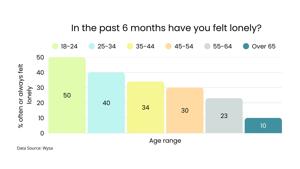Health
Wysa Study Finds Loneliness Poses Greater Health Risks

A recent study by the mental health app company Wysa has revealed that loneliness has a more significant impact on health than demographic factors such as age or socioeconomic status. The findings, released on October 10, 2025, indicate that individuals experiencing loneliness face higher risks of various health issues, challenging existing assumptions about the determinants of well-being.
The research highlights that loneliness can lead to detrimental health outcomes comparable to those associated with smoking or obesity. According to Wysa, this emphasizes the need for a more nuanced understanding of mental health, particularly as it relates to social connections. The study utilized data from a diverse group of participants, aiming to uncover the intricate links between social isolation and physical health.
Key Findings on Loneliness and Health
The study involved a comprehensive analysis of over 10,000 survey responses, focusing on self-reported feelings of loneliness and health status. Results indicated that individuals who reported higher levels of loneliness were significantly more likely to suffer from chronic conditions, including heart disease and depression.
Wysa’s findings suggest that the physiological effects of loneliness are profound. The research team noted that loneliness can trigger stress responses in the body, leading to inflammation and other health complications. As Wysa co-founder Ramya Raghavan stated, “Recognizing loneliness as a serious public health issue is crucial. We must prioritize mental well-being to improve overall health outcomes.”
Implications for Public Health Strategies
As the global population continues to grapple with rising rates of loneliness, particularly in the wake of the COVID-19 pandemic, the implications of this study are significant. Public health officials are urged to incorporate strategies aimed at combating loneliness into their frameworks.
The findings underscore the importance of social support systems and community engagement as critical components of health promotion. Wysa advocates for programs that foster social connections, suggesting that initiatives aimed at reducing isolation can lead to healthier populations.
Moreover, the study calls for further research into the long-term consequences of loneliness on health, particularly among vulnerable populations. Understanding these dynamics can inform policy decisions and healthcare practices, ultimately enhancing the quality of life for many individuals.
Overall, the Wysa study presents compelling evidence that loneliness is a pressing health concern, necessitating immediate attention from both healthcare providers and policymakers alike. By addressing this issue, society can work towards creating a healthier future for all.
-

 Lifestyle5 months ago
Lifestyle5 months agoLibraries Challenge Rising E-Book Costs Amid Growing Demand
-

 Sports4 months ago
Sports4 months agoTyreek Hill Responds to Tua Tagovailoa’s Comments on Team Dynamics
-

 Sports5 months ago
Sports5 months agoLiverpool Secures Agreement to Sign Young Striker Will Wright
-

 Lifestyle5 months ago
Lifestyle5 months agoSave Your Split Tomatoes: Expert Tips for Gardeners
-

 Lifestyle5 months ago
Lifestyle5 months agoPrincess Beatrice’s Daughter Athena Joins Siblings at London Parade
-

 Science4 months ago
Science4 months agoSan Francisco Hosts Unique Contest to Identify “Performative Males”
-

 World4 months ago
World4 months agoWinter Storms Lash New South Wales with Snow, Flood Risks
-

 Science5 months ago
Science5 months agoTrump Administration Moves to Repeal Key Climate Regulation
-

 Business5 months ago
Business5 months agoSoFi Technologies Shares Slip 2% Following Insider Stock Sale
-

 Science5 months ago
Science5 months agoNew Tool Reveals Link Between Horse Coat Condition and Parasites
-

 Sports5 months ago
Sports5 months agoElon Musk Sculpture Travels From Utah to Yosemite National Park
-

 Science5 months ago
Science5 months agoNew Study Confirms Humans Transported Stonehenge Bluestones









